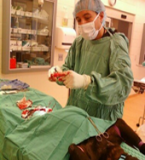Blindness in Dogs and Cats
Blindness in dogs and cats can be caused by a number of reasons. And although it is not usually considered a serious condition, blindness can be a life-altering experience for both you and your pet. Fortunately, pets with vision loss can lead a full and happy life as long as the proper veterinary and home care is provided.
Causes
Blindness in older pets is oftentimes a normal part of the aging process. It can also be caused by genetic conditions, such as cataracts, which is common in certain dog (Poodles, Huskies, Cocker Spaniels) and cat breeds (Persians and Himalayans). Other health problems associated with blindness in pets include glaucoma, hypertension, trauma, uveitis, congenital defects, ocular neoplasia, corneal ulceration, feline herpes virus, and progressive retinal atrophy.
Symptoms
Common symptoms of vision loss in pets include:
- Being extra cautious when walking
- Using their sense of smell and hearing more than usual
- Bumping into furniture and other objects
- Abnormal eye appearance: cloudy, irritated, inflamed, dilated, etc.
- Change in behavior: lethargic, unwillingness to play, fearful, decreased activity, etc.
If you suspect your pet may be losing their vision, you can rearrange some of the furniture in a room, turn the light off, call him over to you, and see how your dog or cat reacts. Pets with impaired vision cannot see as well in dim light and as a consequence will bump into things while trying to get from one place to the other.
Treatment
The first thing you should do if your pet is exhibiting signs of blindness is schedule an appointment with your vet. The sooner the better, as some forms of vision loss can be treated or slowed down when diagnosed early. Tests that may be performed during the exam are:
- Ophthalmoscopy: examination of the eyes with a handheld device that contains a light
- Tonometry: test to check eye pressure
- Fluorescein stain: staining of the cornea to check for an eye ulcer or injury
Treatment will depend on the underlying cause and symptoms. Your veterinarian may also refer you to an ophthalmologist if he or she feels further testing or specialized veterinary care is necessary.
Home Management
Most pets cope well with blindness, especially if they have their family’s full support. The most important thing to keep in mind when caring for your blind cat or dog is their safety. Cats with vision loss should not be let out at all, whereas blind dogs can go outside as long as supervision is provided. Even if your dog can get around pretty well on his own, he is still vulnerable to being attacked by other animals and people or getting into an accident. Other things you can do to help your pet cope with blindness are as follows:
- Keep the environment familiar
- Cover corners and eliminate other possible hazards to prevent your pet from getting injured
- Leave your pet’s bed, food bowl, and water bowl in the same area
- Apply scented spray on furniture and other objects to help guide your dog around the home
- If things are moved around in the home, be sure to patiently show your pet the changes
- Encourage your pet to use his other senses by picking out special toys and coming up with unique activities
- Use your voice and touch to communicate your love and support to your beloved companion






